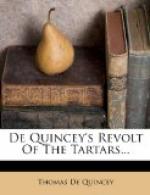Not all of De Quincey’s boyhood, however, was passed under influences so serious and mystical as these. He was early compelled to undergo what he is pleased to call his “introduction to the world of strife.” His brother William, five years the senior of Thomas, appears to have been endowed with an imagination as remarkable as his own. “His genius for mischief,” says Thomas, “amounted to inspiration.” Very amusing are the chronicles of the little autocracy thus despotized by William. The assumption of the young tyrant was magnificent. Along with the prerogatives and privileges of seniority, he took upon himself as well certain responsibilities more galling to his half-dozen uneasy subordinates, doubtless, than the undisputed hereditary rights of age. William constituted himself the educational guide of the nursery, proclaiming theories, delivering lectures, performing experiments, asserting opinions upon subjects diverse and erudite. Indeed, a vigorous spirit was housed in William’s body, and but for his early death, this lad also might have brought lustre to the family name.
A real introduction to the world of strife came with the development of a lively feud between the two brothers on the one side, and on the other a crowd of young belligerents employed in a cotton factory on the road between Greenhay and Manchester, where the boys now attended school. Active hostilities occurred daily when the two “aristocrats” passed the factory on their way home at the hour when its inmates emerged from their labor. The dread of this encounter hung like a cloud over Thomas, yet he followed William loyally, and served with all the spirit of a cadet of the house. Imagination played an important part in this campaign, and it is for that reason primarily that to this and the other incidents of De Quincey’s childhood prominence is here given; in no better way can we come to an understanding of the real nature of this singular man.
In 1796 the home at Greenhay was broken up. The irrepressible William was sent to London to study art; Mrs. De Quincey removed to Bath, and Thomas was placed in the grammar school of that town; a younger brother, Richard, in all respects a pleasing contrast to William, was a sympathetic comrade and schoolmate. For two years De Quincey remained in this school, achieving a great reputation in the study of Latin, and living a congenial, comfortable life. This




